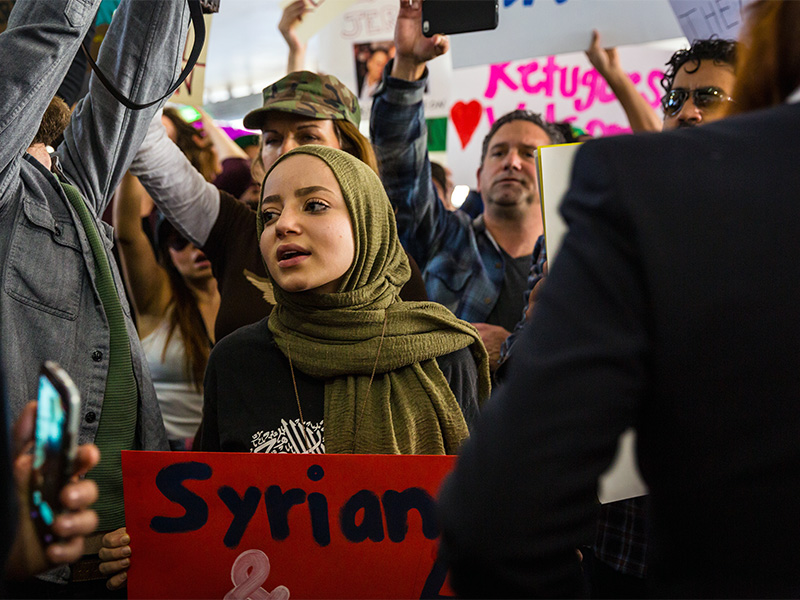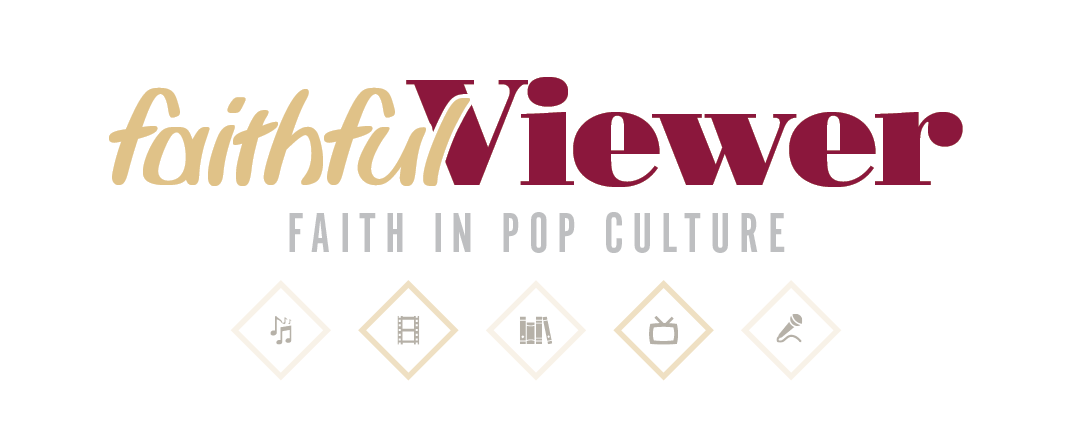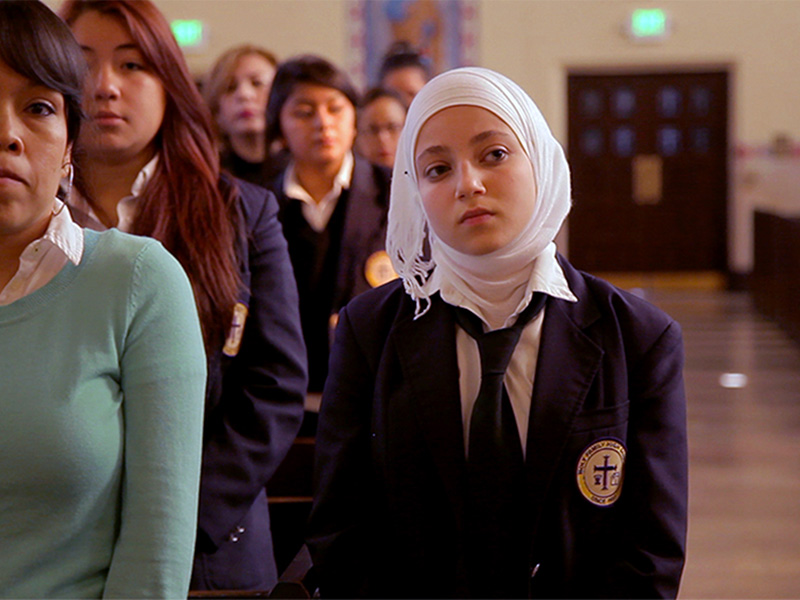(RNS) For Rudayna Aksh, the decision to bring her 13-year-old daughter, Dalya Zeno, from Aleppo to Los Angeles was made for her.

Dalya Zeno and her mother, Rudayna Aksh, hugging. Photo courtesy of Julia Meltzer
“We were sleeping one night,” Aksh remembers. “We heard, like, a big bomb around our house.” The Syrian war had begun and young girls were being kidnapped.
“The war didn’t leave any choice for me,” she continues. “I had to come here with my daughter.”
Those are the first words of “Dalya’s Other Country,” a new film by Julia Meltzer that premieres Monday night (June 26) on the PBS program “POV.” The film is one of four “POV” will broadcast with a focus on Syria and Syrian refugees.
[ad number=“1”]
PBS is touting the film as a saga of displacement, adaptation and growing up and out. But the film is just as concerned with how Dalya and her mother, who are hijab-wearing Muslims, adapt their religious and cultural traditions to their new home.
Dalya becomes the only Muslim student at an all-girls Catholic high school, and Aksh confronts the dissolution of her marriage.

“Dalya’s Other Country” director Julia Meltzer. Photo courtesy of David Meltzer
“I really hope people come away understanding something of how Dalya and Rudayna see the world as Muslim women in America at this moment,” Meltzer said. “Many of their traditions that connect to their religion are passed down, are part of their family life, and I think it is good to demystify them.”
The mother and daughter came to Los Angeles, where Dalya’s older brother Mustafa Rony Zeno was attending college, in 2012.
Meltzer, who is Jewish, and Mustafa Zeno, who is Muslim, met in 2013 at a screening of her first documentary feature, “The Light in Her Eyes,” about a group of Syrian girls who studied the Quran in a Damascus mosque — unusual for Muslim girls.
“I grew up in Syria and I felt that was a world I should have known, but I did not,” Mustafa Zeno said. “The way Julia portrayed that world, with intimacy and honesty, I was really comfortable with talking to her about my mother and my sister.”
Meltzer planned to follow Dalya through her four years of high school. But gradually, Aksh’s own story began to push through, too. Her husband, Mohamad Hassan, divorced her when she would not agree to his taking a second wife — Muslim men may take up to four wives, but only with the first wife’s permission.
[ad number=“2”]
The film cuts between shots of Dalya putting on makeup with girlfriends and going to a mall and of Aksh describing the loneliness and isolation she feels as a divorced Muslim woman. Hassan — who lives in Turkey — visits, but he and his ex-wife barely speak.
“My life in Syria, it was just cooking, cleaning, having people over. That’s it,” Aksh says, alone in the apartment she shares with her son and daughter. “I feel like I’m on a different planet. … So many things to learn.”

Dalya Zeno protests the Muslim travel ban at LAX on Jan. 29, 2017. Photo courtesy of Dustin Pearlman
Showing his mother and his sister making their own decisions was important to Mustafa Zeno.
“It is important for me that people understand Muslim women are full beings with agency, not just victims of an oppressive system — the way I see Muslim women portrayed in all kinds of different media,” he said. “When something happened to my mother she felt was oppressive she didn’t accept it. It’s the same with my sister. She adapted to her new situation and found her own equilibrium.”
[ad number=“3”]
But mother and daughter sometimes react differently to prejudice. When they watch a video of Donald Trump, then a presidential candidate, calling Muslims “a big problem” and promising a “Muslim ban,” Dalya continues to wear her hijab — to the prom, on the basketball court, to graduation — but Aksh covers hers with a knit cap.
“I’m not hiding my hijab,” Aksh says when her daughter confronts her. “I am merely wearing this to avoid weird people … just to be on the safe side.”
Meltzer’s next feature project will trace the migration of African-Americans from Louisiana to Los Angeles through the prism of the poet Robin Coste Lewis‘ family. But first, there will be one more chapter in this family’s story — in the fall, Aksh will enter the University of California, Los Angeles, and Meltzer and Mustafa Zeno hope to make a short film of Aksh’s first day at school.
Meanwhile, they remain drawn to stories about religion.
“We both have an interest in reaching across the divide,” Meltzer said. “That is not something we sit and talk about every day. It is just how we feel and how we do the work that we do.”

Faithful Viewer logo. Religion News Service graphic by T.J. Thomson





